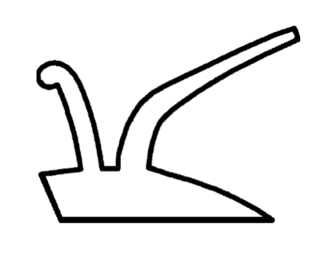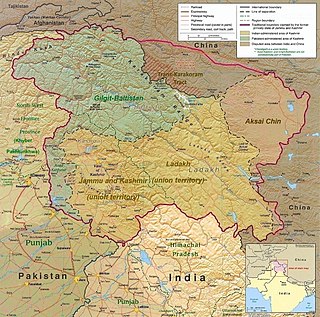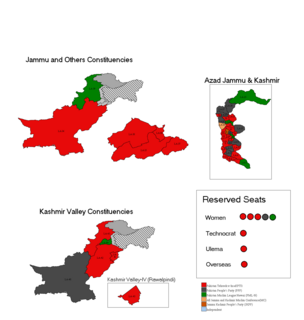
Azad Jammu and Kashmir, abbreviated as AJK and colloquially referred to as simply Azad Kashmir, is a region administered by Pakistan as a nominally self-governing entity and constituting the western portion of the larger Kashmir region, which has been the subject of a dispute between India and Pakistan since 1947. The territory shares a border to the north with Gilgit-Baltistan, together with which it is referred to by the United Nations and other international organizations as "Pakistani-administered Kashmir". Azad Kashmir also shares borders with the Pakistani provinces of Punjab and Khyber Pakhtunkhwa to the south and west, respectively. On its eastern side, Azad Kashmir is separated from the Indian union territory of Jammu and Kashmir by the Line of Control (LoC), which serves as the de facto border between the Indian- and Pakistani-controlled parts of Kashmir. Geographically, the administrative territory of Azad Jammu and Kashmir covers a total area of 13,297 km2 (5,134 sq mi) and has a total population of 4,045,366 as per the 2017 national census.

The Politics of Pakistan takes place within the framework established by the constitution. The country is a federal parliamentary republic in which provincial governments enjoy a high degree of autonomy and residuary powers. Executive power is vested with the national cabinet which is headed by Prime Minister of Pakistan, who works coherently along with the bicameral parliament and the judicature. Stipulations set by the constitution provide a delicate check and balance of sharing powers between executive, legislative, and judicial branches of the government.

Jammu and Kashmir was a region formerly administered by India as a state from 1952 to 2019, constituting the southern and southeastern portion of the larger Kashmir region, which has been the subject of a dispute between India, Pakistan and China since the mid-20th century. The underlying region of this state were parts of the former princely state of Jammu and Kashmir, whose western districts, now known as Azad Kashmir, and northern territories, now known as Gilgit-Baltistan, are administered by Pakistan. The Aksai Chin region in the east, bordering Tibet, has been under Chinese control since 1962.

The Jammu & Kashmir National Conference (JKNC) is a regional political party in the Indian union territories of Jammu and Kashmir and Ladakh. Founded as the All Jammu and Kashmir Muslim Conference by Sheikh Abdullah and Chaudhry Ghulam Abbas in 1932 in the princely state of Jammu and Kashmir, the organisation renamed itself to "National Conference" in 1939 in order to represent all the people of the state. It supported the accession of the princely state to India in 1947. Prior to that, in 1941, a group led by Ghulam Abbas broke off from the National Conference and revived the old Muslim Conference. The revived Muslim Conference supported the accession of the princely state to Pakistan and led the movement for Azad Kashmir.

The Kashmir conflict is a territorial conflict over the Kashmir region, primarily between India and Pakistan, with China playing a third-party role. The conflict started after the partition of India in 1947 as both India and Pakistan claimed the entirety of the former princely state of Jammu and Kashmir. It is a dispute over the region that escalated into three wars between India and Pakistan and several other armed skirmishes. India controls approximately 55% of the land area of the region that includes Jammu, the Kashmir Valley, most of Ladakh, the Siachen Glacier, and 70% of its population; Pakistan controls approximately 30% of the land area that includes Azad Kashmir and Gilgit-Baltistan; and China controls the remaining 15% of the land area that includes the Aksai Chin region, the mostly uninhabited Trans-Karakoram Tract, and part of the Demchok sector.

Article 370 of the Indian constitution gave special status to Jammu and Kashmir, a region located in the northern part of Indian subcontinent and part of the larger region of Kashmir which has been the subject of a dispute between India, Pakistan and China since 1947. Jammu and Kashmir was administered by India as a state from 1952 to 31 October 2019, and Article 370 conferred on it the power to have a separate constitution, a state flag, and autonomy of internal administration.
The Constitution of Jammu and Kashmir was the legal Constitution which established the framework for the state government of the Indian state of Jammu and Kashmir. The constitution was adopted on 17 November 1956, and came into effect on 26 January 1957. It was rendered infructuous on 5 August 2019 by an order signed by the President of India and ceased to be applicable on that date. It also included Ladakh.
The Jammu and Kashmir Legislative Assembly also known as the Jammu and Kashmir Vidhan Sabha is the legislature of Indian union territory of Jammu and Kashmir.
Pakistan officially joined the United Nations (UN) on 30 September 1947 just over a month after it came into existence. Today, it is a charter member and participates in all of the UN's specialised agencies and organisations. Pakistan has been elected seven times into the UN Security Council, with the most recent term in 2013. It is also one of the countries which has had a diplomat, Muhammad Zafarullah Khan, serve a term as the President of the United Nations General Assembly.

The history of Azad Kashmir, a part of the Kashmir region administered by Pakistan, is related to the history of the Kashmir region during the Dogra rule. Azad Kashmir borders the Pakistani provinces of Punjab and Khyber Pakhtunkhwa to the south and west respectively, Gilgit–Baltistan to the north, and the Indian union territory of Jammu and Kashmir to the east.

Elections in the Union Territory of Jammu and Kashmir are conducted in accordance with the Constitution of India to elect the representatives of various bodies at national, state and district levels including the 114 seat unicameral Jammu and Kashmir Legislative Assembly and the Parliament of India. The first elections in the Union Territory of Jammu and Kashmir took place between 28 November and 19 December 2020 in the form of by-elections to District Development Councils and municipal and panchayat level bodies. A fresh delimitation process for assembly constituencies began in February-March 2020.
Karachi Agreement is an agreement purportedly executed on 28 April 1949 between the Government of Pakistan and the then Government of Azad Kashmir governing the relations between Pakistan and Azad Kashmir. It set down the division of the powers between the two governments as well as the All Jammu and Kashmir Muslim Conference. Through the agreement, Azad Kashmir ceded to the Government of Pakistan complete control over Gilgit-Baltistan, and the control over subjects of defence, foreign affairs and communications in its area.

The Government of Azad Kashmir is the state government which administers one of the territories of Pakistani-administered Kashmir territories of Azad Kashmir. The Azad Kashmir government consists of a president as head of state and a prime minister as chief executive, with the support of a council of ministers. The state assembly is the Azad Kashmir Legislative Assembly.

After the Partition of India, during October–November 1947 in the Jammu region of the princely state of Jammu and Kashmir, many Muslims were massacred and others driven away to West Punjab. The killings were carried out by extremist Hindus and Sikhs, aided and abetted by the forces of Maharaja Hari Singh. The activists of the Rashtriya Swayamsevak Sangh (RSS) played a key role in planning and executing the riots. An estimated 20,000–100,000 Muslims were massacred. Subsequently, many non-Muslims were massacred by Pakistani tribesmen and soldiers, in the Mirpur region of today's Pakistani administered Kashmir. An estimated 30,000 Hindus and Sikhs were also massacred in the Rajouri area of Jammu division.

The Ministry of Kashmir Affairs & Gilgit-Baltistan is a ministry of the Government of Pakistan. It handles the regional affairs of Azad Jammu and Kashmir and Gilgit-Baltistan as both territories of Pakistani-administered Kashmir do not have regular provincial status within Pakistan due to political circumstances revolving around the long-running Kashmir conflict.

Jammu and Kashmir is a region administered by India as a union territory and consists of the southern portion of the larger Kashmir region, which has been the subject of a dispute between India and Pakistan since 1947, and between India and China since 1962. The Line of Control separates Jammu and Kashmir from the Pakistani-administered territories of Azad Kashmir and Gilgit-Baltistan in the west and north. It lies to the north of the Indian states of Himachal Pradesh and Punjab and to the west of Ladakh, which is also subject to the dispute as a part of Kashmir, and administered by India as a union territory.
The Jammu and Kashmir Reorganisation Act, 2019 is an act of the parliament of India containing provisions to reconstitute the Indian-administered state of Jammu and Kashmir, a part of the larger region of Kashmir which has been the subject of dispute among India, Pakistan, and China since 1947, into two Indian-administered union territories (UTs) called Jammu and Kashmir, and Ladakh, and becoming effective on 31 October 2019. A bill for the act was introduced by the Minister of Home Affairs, Amit Shah, in the Rajya Sabha on 5 August 2019 and was passed on the same day. It was then passed by the Lok Sabha on 6 August 2019 and it received the president's assent on 9 August 2019.

Kashmiris in Azad Kashmir are the ethnic Kashmiri people who reside in Azad Kashmir, a territory which constitutes part of Pakistani-administered Kashmir since the end of the First Kashmir War. Their demographic includes up to 40,000 registered Kashmiri refugees who have fled the Kashmir Valley, located in Indian-administered Kashmir, to Pakistan since the late 1980s due to conflict in the region. As of 2010, only around 60 percent of Kashmiri refugees had acquired Pakistani citizenship.

General Elections were held in Azad Kashmir on 25 July 2021 after the expiry of the 5-year term of the previous Legislative Assembly. The 2021 General Elections of Azad Jammu and Kashmir held on 25 July, the region's election commission announced on Thursday. The elections were held in 33 constituencies of Azad Kashmir and 12 constituencies of the refugees of Jammu and Kashmir.

The Interim Constitution of Azad Jammu and Kashmir provides for an apparently transitory autonomous parliamentary framework of self-governance and power sharing for the region of Azad Jammu and Kashmir, defined by the act as the "territories of the State of Jammu and Kashmir which have been liberated by the people of that State and for the time being under the administration of Government and such other territories as may hereafter come under its administration", however it does not pertain to areas such as Gilgit, Hunza and Baltistan. The act succeeded and re-enacted the Azad Jammu and Kashmir Government Act, 1970 with modifications. It was promulgated under the Prime Minister of Pakistan Zulfiqar Ali Bhutto. The constitution has been amended 14 times. It is based on the 1973 Constitution of Pakistan.












